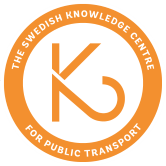Article highlighted
Sustainable business travel

Sonja Forward, Senior Researcher at the Swedish National Road and Transport Research Institute (VTI), has been in charge of a project looking at business travel and how this can become more sustainable. Sonja believes there are various ways in which to accomplish this:
“Many of the companies and organisations we have interviewed have a transport policy to encourage environmentally friendly business travel. The effectiveness of such policies is, however, highly dependent on compliance and if management is leading by example. There are still workplaces where a company car is seen as a status symbol. Although we also found companies who offered electric bike hire or travel cards to their employees”, argues Sonja Forward.
A large number of business trips are connected with in-person meetings, which sometimes can be replaced by virtual meetings, as long as the technology provided by the employer works well and the employees know how to use it. Of course, some car trips might be more difficult to replace, such as trips where the worker needs to transport a lot of goods.
Business travel made easy with an app
Besides examining the mode of transport used for business travel, the project has also developed and evaluated a travel app with the aim to make booking and payment of business travel easy. Most users reported that they were happy with the app.
“When it comes to business travel, it is important to remember that people in general want the booking process to be as easy and as quick as possible. We know that if everything is made easy, i.e. simple to book and pay with the added bonus of being able to book hotels and local transport at the same time, then the chances increases that people will start using the travel app and travel more by public transport”, Sonja Forward says.
“What is needed is a travel app which fulfils all the important requirements and can be used across the country, but for this to be accomplished, a great deal of coordination is required”, she adds.
Sonja Forward is also aware of research projects which have developed travel apps but when the project ends they are never used again. A huge waste of resources in Sonja’s opinion.
Creating new habits
“As with most other modes of travel, business travel is habitual. The disinclination to use public transport amongst non-users is often based on someone else’s experience or on what is written in the media, as well as rumours that may not always be true.”
By using an incentive, such as a free bus pass, people may experience for themselves that travelling by public transport is not as inconvenient or slow as they previously believed. However, if the experience is negative, the risk is that people will revert to their old habits. Consequently, it is important that the service provider creates an inviting and well-functioning travel environment and do not, for example, try to squeeze in as many passengers as possible onboard its trains and buses. It is also important that travelling by public transport does not take a much longer time than travelling by car. The risk is then that only the most eco-conscious travellers or those who cannot afford travelling by car, will travel by public transport. The main priority must be to meet the needs of the traveller and not to generate profit. In other words, a win-win solution for the environment!’
This K2 Research Project is funded by Vinnova, Sweden’s Innovation Agency. Project contributors include the Swedish National Road and Transport Research Institute (VTI), Lund University and Samtrafiken Sverige AB.
